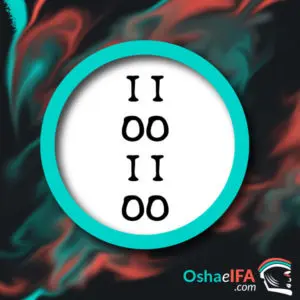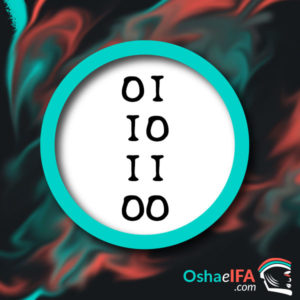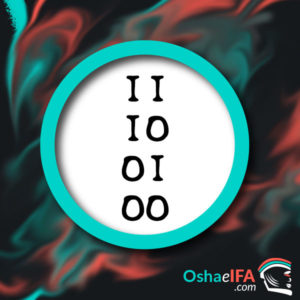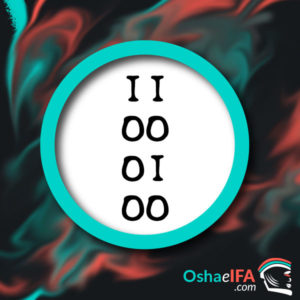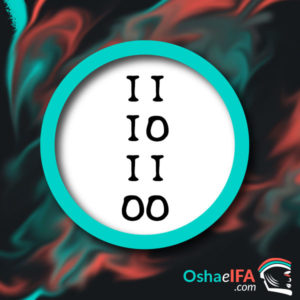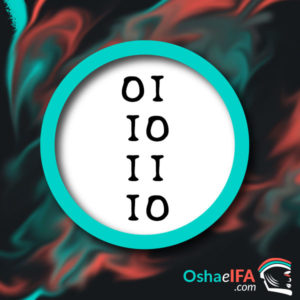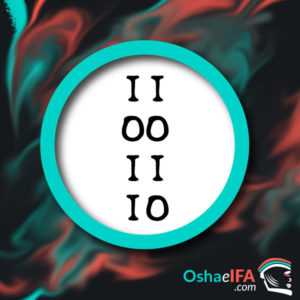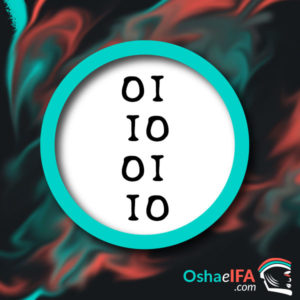Oshe Ka (Òsé Ìká)

Oshe Ka, is the union of the Ojú Odù Òsé and Ìká, and is situated as sign number 233 within the Lordly Order of Ifá. This Odu, reflected in the motto "Wherever my head takes me, there I will be", embodies the importance of following our own path with firmness and conviction.. It represents the essential freedom to choose our destiny, beyond external influences and circumstances, emphasizing personal autonomy in the search for the life we want.
General Analysis of Odu Oshe Ka:
Oshe Ka stands out for his ability to transform difficulties into victories, symbolizing the rise from a subordinate position to one of leadership and recognition. This Odu suggests that initial challenges can be overcome through persistence and compliance with proper rituals, such as offerings to the Orishas. Economically, it is recommended to perform Ebó to ensure success in business and financial stability, reflecting an approach of caution and preparation for challenges.
Health Aspects:
Oshe Ka warns about conditions such as asthma and fractures, as well as serious cardiovascular diseases such as heart attacks and strokes. This health alert highlights the importance of taking care of the physical body and taking precautions in daily life, especially in mobility and physical exertion, to prevent serious incidents.
Religious Aspects:
This Odu emphasizes the intimate relationship between spiritual actions and material consequences. Practitioners must offer regular sacrifices and prayers to Oshun and Yemaya, as well as follow Ifá commands faithfully to ensure protection and spiritual guidance. It is highlighted that adversities can become blessings if respectful behavior and commitment to religious precepts is maintained.
Personal Relationships (Love):
In the realm of love, Oshe Ka suggests that envy and betrayal can be significant challenges, but also offers the possibility of overcoming these obstacles through truth and fidelity to ethical principles. Family relationships can be marked by conflict, but there is also room for reconciliation and shared strength.
Description and Features:
Names or aliases:
- Oshe Ka.
- Oshe Ika.
- Òsé Ìká.
What is born in Oshe Ka?
- That in Atefa, Awofakan and Ikofafun (Hand of Orula) 2 chickens are given to Oshun, within 5 days or within that period.
- Asthma.
- The ewé chicken leg.
- The Awó is wicked, wicked and unjust.
- Orunmila was a black magic sorcerer.
- Luck comes to him above the water.
- He carries an Osain that rides on a snail.
The Oshe Ika sign points out:
- Wherever his head takes him, there he is.
- The Iyese Mode lands (from Oshun) and the Akarakaniye land (from Inle) are joined.
- Shakpana asserted his power in Aiye.
- Watuto (the cock of the river) is the messenger of Elegua and Azojuano.
- There is a legal threat to the client.
- There is a war between corojo and cotton.
- Oshun is angry and punishes severely.
- The Eweses are: Pata de Gallina, Guizazo de Caballo and Ebano Carbonero.
- Elegba rode a horse and was blind.
What does the Oshe Ka sign talk about?
- This Odu speaks of control over difficulties and victory over enemies. There may be a legal threat to the person from past associations or conduct.
- Oshe Ka says: wherever my head takes me, I will be there.
- Because of this Odu one suffers from asthma. Be careful, he doesn't die from lack of air or drowning.
- This is the Ifá of the slave and the daughter of the King.
- The evil that they do to him will turn out to be good.
Recommendations:
- Pour water on the door immediately when you see this Odu.
- Perform Ebó to ensure success in business.
- Pray the head and perform Ebó for the children before initiating them into the religion.
- Pray daily to Olofin and Yemaya when you go to bed and when you get up.
- Give a white rooster into the river and ensure that the blood flows throughout the body before burying it on the shore.
- Receive Inle and Abata.
- Take precautions for seven days after a divination to avoid accidents, including not riding vehicles or climbing stairs hastily.
- Ask Olorumare by using fire and smoke in rituals.
Prohibitions:
- Do not eat yam.
- Avoid giving words or commitments when this Odu appears under the circumstances of death (Iku) or illness (Arun), especially if the person is in bed with severe difficulties recovering.
- Do not ride vehicles or animal traction for seven days after receiving this Odu in divination to avoid accidents.
- Avoid situations that may cause strong impressions or stress, as they can lead to a heart attack or stroke.
- Because of this Odu, the person cannot be loud, nor believe that he is the one who knows the most. You will have to beg your head, you will not attend wakes and you have to do EBO for your children before making you Santo.
You can read: Ssign of Ifa Oshe Meyi
Oshe Ka Sayings:
- Patience has a limit.
- Things are done at the right time.
- Wherever your head takes you, there it is.
- Orunmila conquers his enemies.
- The evil that they do to him will turn into good.
- The dead man leaves a message.
- He who crushes an egg, is always stained.
The saying "He who crushes an egg is always stained" tells us about the inevitable consequences of our actions. Each decision carries implicit responsibilities and results, often irreversible, that affect us directly, teaching us that our actions always leave traces on us and our environment.
Ethical code:
- The Awó must never be unfair.
Meaning of the sign of Ifa Oshe Ka
- This is the Ifá of the King's slave who became King in another land.
- Oshe Ka is an Odu of iniquity, evil and vice, the Awó is iniquitous (evil, unjust).
- Here Orunmila worked black magic.
- This Odu (Oshe Ika) marks fractures of bones, arms and legs due to accidents.
- There is a grass that walks from birth because it has feet, legs and hands, it is the chicken's foot.
- Above the water comes a great deal of money.
- Elegba rode a horse and was blind.
- Beware of hot flashes.
- Odu diseases: Asthma, limb fractures from accidents, heart attack, stroke, blindness.
- Because of this Odu, they catch him doing something that doesn't suit some close friends and they punish him.
- The person with this Odu will be highly respected in his profession, but envy and betrayal haunt him and his luck is elsewhere, where he becomes King.
- This Ifá indicates fight between brothers, carnal or religious.
- Oshe Ka is an Odu to find himself in precarious situations, but he comes out of them.
- This is an Ifá sign of being in precarious situations, but it comes out of them.
- Shango and San Lázaro are fundamental in this Odu.
- The Odu speaks of control over difficulties and victory over enemies.
- Someone who has violated the law or is an intransigent, can implicate you in facts. If he fulfills the mandates of Ifá, he defeats his enemies.
- Oshe Ka predicts that there is always something superior to man.
- Take care of your eyesight and put the 5 senses in your wandering, to avoid disasters.
- Take care of the physical offense with an Omó of Oshun, of any sex.
- Past associations and behaviors lead to legal problems.
- For this Odu, when the Awó or another person falls to the ground, earth is taken from that place, 1 rooster, four stakes and chicken foot grass to make him Ebó.
- For this Odu an Inshé Osanyin is mounted on a cobo snail and if it is for a pocket it is mounted on a small one.
You can read: Treaty of the Ika Fa Sign
Ifa says: Oshe Ka
You should be cautious around aquatic environments, and if you encounter five women who are daughters of Oshun, offer them five gourds as tribute. He will soon receive money through a woman; Wear white to attract that fortune. You have quickly acquired skills that even those who started before you have not yet mastered, which has sparked envy among them. This envy could involve you in legal complications. If you are asked to go somewhere, perform an Ebo before leaving, and do not forget to thank your head, Oshun and his mother.
You will be informed about the death of someone you know; Avoid attending wakes and maintain respect for your elders. Don't presume to know more than others and control your tone of voice. Only visit the sick in exceptional situations. Despite feeling trapped, a significant incident will soon bring you good fortune, and a trip could improve your position.
Although you have good luck and a sharp mind, you must be cautious and not overconfident. Be careful to avoid falls and respiratory problems, especially avoiding dust and unsuitable environments. Emotional stresses and weather changes can exacerbate your respiratory conditions, and a simple cold could trigger more serious broncho-respiratory complications.
Prayer of the Odu Oshe Ka:
Oshe Karaka Adifafun Orunmila Umbati Ibu Losa Omo Eru Oshun Kayode Oma Unfo Oluwo Osain Inle Akarabaniye Oro Kopide Timlomu Kola Keyu Ibiarara Awo Impo Oroguye Oshe Ka Aye Inle Adifafun Aye Umbo Tishe Oun Bogboibata Oluwo Osain Inle Akarabaniye Oro Kopide Girita Awo Impo Oroguye.
Patakies (Stories) of the Oshe Ka sign:
The Slave Who Became King
In one town, the governor had a slave who was secretly in a room feeding his own head, a ritual to improve his luck. Upon being discovered by his master, the slave explained his action, but the master, incredulous and angry, warned him that he would soon see what his head would really bring him. As punishment, he ordered the slave to be locked in a wooden box and thrown into the sea.
Carried away by the current, the slave spent several days adrift. During this time, in a far away land, a king passed away. The wise men of that place had prophesied that their new leader would arrive from the sea. When the box with the slave was found floating near the shore, they opened it, rescued him, and cared for him. Upon informing the wise men, they confirmed that he was the man destined to be the new king.
During his coronation, all the governors of the neighboring regions attended, including the one who had sent the slave to sea. Upon recognizing his former slave, the governor was stunned and asked for forgiveness. The new king responded by thanking the governor, because without his cruel act, he would never have become king. Unfortunately, the story concludes with the death of the new king during the banquet.
Explanation: This pataki teaches how impulsive and cruel acts can have unexpected consequences and how a person's destiny can change drastically due to the actions of others. Despite the governor's malicious intentions, his action led the slave to a great future, proving that sometimes what appears to be a tragic ending can be just the beginning of something great.
You can read: Odu of Ifa Odi Yekun
Oshe Ika Ifa Traditional
I KNOW ÌKÁ
Ó be pákája
Ó rìn pákája
A day fún Onímòka ònà Òfà
Èyí tí babaa rèé ko okùún là lójó láíláí
Okùn ni baba Onímòká móo ko telè rí
Onímòká bá fi okùn kíko Sílè
ó lóun ó ko mó
Or is it seen?
Kò rójútùú è
Ó bá to àwon 'Ó se pákája'
Àwon 'Ó rìn pákája' lo
Wón ní Onímòká ònà Òfà
'Okùn ni babaà ré móo ko télè'
'Sóó le móo sisée babaà re'?
'Bóò bá se isé òhún'
'Pàbó ni gbogbo è'
Onímòká lóun gbón
Oh you so
Ení ó kú ótóó gbón nìyá je
Onímòká Ònà Òfá bá bó Síbi okùun baba è
Ní bá n ko okùn
Bó bá ko éyí
They were neither he and so
Ola bá de
N ní wá n jó ní wá n yò
Ní n yin àwon Babaláwo
Àwon Babaláwo n yin Ifá
Ó ní béè làwon Babaláwo tòún wí
Ó be pákája
Ó rìn pákája
A day fún Onímòka ònà Òfà
Èyí tí babaa rèé ko okùún là lójó láíláí
Won nísée baba rè ní or móo se
Àwá or kokùn kokùn
A or kokùn lájé
Àwá or kokùn kokùn
A or kokùn láya
Àwá or kokùn kokùn
A or kokùn bímo
Àwá or kokùn kokùn
Aó kokùn nire gbogbo
Àyàmò bí Onímòká ònà Òfà ò bá kokùn kó là layé.
Ifá says that this person must continue in the belief and occupation system of their ancestors; otherwise he will be in trouble.
Ó be pákája
Ó rìn pákája
They were the ones who made divination for Onímòka ònà Òfà
The one whose ancestors had always been making wealth from the necklace business
Onímòká's father had always been in the necklace-making business
He said he wasn't interested in it anymore
He did everything with his hands in other businesses
And couldn't find any progress
He then went to the house of the priests 'Ó sé pákája'
The priests 'Ó rìn pákája'
'Onímòká ònà Òfà'; they caught his attention
'His father's occupation had always been the making of necklaces'
'Will you be able to continue it?'
'If you refuse work'
'All your efforts will be useless'
'I am wise now' Onímòká said
'That's fine'
'It is he who is dead who has suffered irremediably'
Onímòká shortly after continued with the manufacture of necklaces of his father
He started making necklaces
Of different models and sizes
People bought many from him and used them to immobilize sheep and goats
Wealth came to him
And he started dancing and he was very happy
He praised his Babaláwos
And their Babaláwos praised Ifá
He said it was exactly as his Babaláwos had predicted
Ó be pákája
Ó rìn pákája
They were the ones who made divination for Onímòka ònà Òfà
The one whose ancestors had always been making wealth from the necklace business
They incited him to continue doing his father's occupation
We will make necklaces
We will make necklaces to make a lot of money
We will make necklaces
We will make necklaces to have many wives
We will make necklaces
We will make necklaces to have children
We will make necklaces
We will make necklaces so that we can have all the good things in life
Tell me, if it is not true that Onímòká ònà Òfà made necklaces to become a rich person in life.
